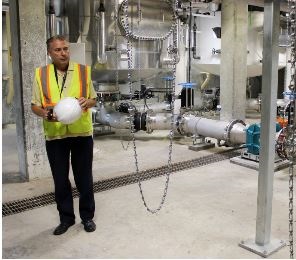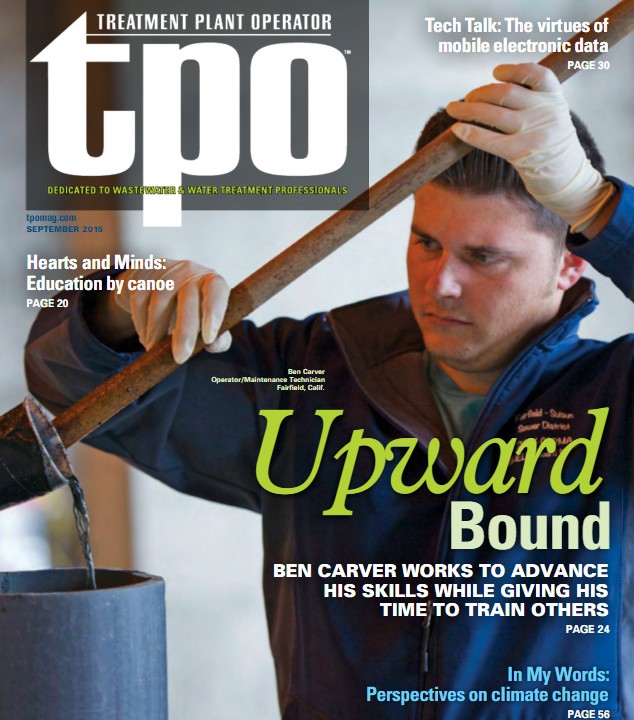Jim Dunbar, general manager and business development manager for Lystek, describes the company’s process for turning treated sewage from the Fairfield-Suisun Sewer District plant into fertilizer for use by farmers, during a tour of the company’s operations, Friday, Oct. 21, 2016. (Glen Faison/Daily Republic) .
FAIRFIELD — Officials from the Fairfield-Suisun Sewer District and Canadian company Lystek pulled the curtain back Friday on a first-of-its-kind process for turning treated sewage into a marketable product – all while helping the environment.
It’s a process that proves the saying that one man’s trash is another man’s treasure.
The company is taking the district’s treated sewage and turning it into high-grade fertilizer that can be customized to meet the needs of farmers. The technology to do so did not exist in California or anywhere else in the United States prior to the Fairfield project, company officials said.
Mayor Harry Price and other officials spoke of the need for agencies across the state to limit the amount of treated sewage that’s sent to municipal dumps for disposal.
That practice releases greenhouse gases as the biosolids are exposed to air once spread for disposal – pollution that’s eliminated in the closed loop that’s part of Lystek’s process.
“This is a bold adventure,” Price said of the Lystek plant and what the company and the sewer district hope to accomplish.
The new Fairfield plant offers a regional fix for a pollution problem that the state’s aggressively trying to corral through the legislative process.
“This is a solution that’s been talked about here in the Bay Area for 10 years,” said Jim Dunbar, general manager and business development manager for the new Lystek plant. “It’s really one of the first steps of getting high-level biosolids out of landfills.”
Not only is the company taking advantage of the latest technology to eliminate the need for the sewer district to stop sending treated sludge to Potrero Hills Landfill, Price said the company’s activities will boost economic development activities as well.
“This is going to encourage more companies to locate here, and not just food service and beverages,” he said. “Pharmaceuticals as well.”
The sewer district serves residents of both Fairfield and Suisun City. City council members from both communities serve as the sewer district’s board of directors.
Kevin Litwiller, director of business development for Lystek, described key benefits of the project that include conversion of treated biosolids to a type of fertilizer that’s cleared by the government for use year-round in agricultural operations; and the ability to create and to capture gasses that can be used to produce green energy to help meet the sewer district’s power needs.
Litwiller said the company’s process is both mundane and special at the same time.
“Each level of our process is not remarkable,” he said. “But taken together we have a process that’s led to nine patents.”
Supervisor Jim Spering said the Lystek process takes care of what he describes as a major local biosolids problem for both Fairfield and Suisun City, though use of “trusted technology.”
“I think this starts to address a very serious byproduct of a plant like we have here,” Spering said, making reference to the sewer district’s operations.
Assemblyman Bill Dodd, D-Napa, spoke of the environmental requirements of legislation passed over the course of the past two years, such as Assembly Bill 1826, which became law in 2014. These new laws are restricting disposal of organic waste in city and county dumps. Dodd also spoke of how the project came together.
“This is an amazing public-private partnership,” he said.
The process to develop the partnership between the sewer district and the company began in late 2013 and took off in early 2014. Dunbar said Lystek was looking to enter the California market, and that the local sewer district’s reputation as an innovative operation was attractive to the company.
About a year of negotiations led to an agreement last summer, which triggered the required permitting process. Also included was a retrofit of a building on the sewer district’s property to accommodate the company’s equipment and state-of-the-art operations.
The agreement grants Lystek virtually all of the sewer district’s treated sludge for 20 years, with an option to extend the agreement for another 10 years.
Dunbar said the company can easily handle all of the sewer district’s outflow – about 14,000 tons per year. The Lystek plant’s capacity is 150,000 tons per year, he said, which will be met by bringing in waste from other agencies across the Bay Area.
Contracts are already in place to take in and process treated waste from Santa Rosa and from the Central Marin Sanitation Agency.
Local officials like what they see.
“I think it’s got a good future,” Spering said. “I’m very impressed with the whole concept of dealing with solid waste.”
Reach Glen Faison at 427-6925 or gfaison@dailyrepublic.net. Follow him on Twitter at www.twitter.com/GlenFaison.


